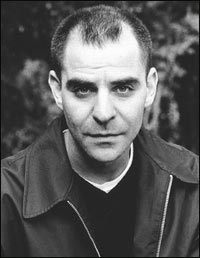David Rakoff is the author of Fraud and Don’t Get Too Comfortable, and a contributor to This American Life.

Listen: Play in new window | Download (Running Time: 50:28 — 46.2MB)
Condition of Mr. Segundo: Bitter towards cheapskates.
Author: David Rakoff
Subjects Discussed: What type of journalist Rakoff is, being careful with revealing a personal life, Gypsy Rose Lee, whether or not Rakoff has contacted the people that he’s written about, working in an ice cream parlor, the distinction between “secretary” and “assistant,” the fear of using a person as comic fodder, the culture of scrutinizing people, contending with a call from Albert Maysles in relation to a Little Edie Beale tribute piece, a sense of disproportionate entitlement, the Log Cabin Republicans, how political views encroach upon a personal essay, the similarities and differences between the real Rakoff and the Rakoff persona, being a shy reporter, finding it difficult to approach people, dwelling on decor, Rakoff’s false belief that he is a hack, Joan Didion’s crop knowledge, Bugs Bunny, Puppetry of the Penis, the need to report upon things alone, Rammstein, being frightened and confronting fear, how details are changed to suit an essay, narrative liberties, being an American immigrant, the difference between writing before 9/11 and after 9/11, writing essays that are love letters to New York, “frauding” readers, Marion Ettlinger and photographic poses, plastic shoes, writing travel pieces, and trying to write fiction.
EXCERPT FROM SHOW:
Rakoff: I’m very indulged. I am allowed to be at least 50% of the story, which is a weird thing to do. And I should learn how to do a little bit less of that. Simply because I think it’s a good set of tools to have. I think all of them are good sets of tools to have. Because of that, because I am allowed to be 50% of the story, I’ve been tremendously careful. From day one, I was tremendously careful about what I revealed and what I didn’t reveal. You know.
Correspondent: Yeah.
Rakoff: No one knows about my family. No one knows about my love life. You know, it’s a very controlled revelation. I’m not a memoirist, for example. Weirdly enough, I’ve been working on pieces that are a little more personal right now. Which has been odd to do. But, yeah, I’m both in the story and not of the story.
Correspondent: But I’m wondering if there’s a certain risk that you have to confess something if you are 50% of the story. I mean, that has got to be a terrible bridge to walk if you really don’t want to reveal things about yourself.
Rakoff: Sure. Yes. But I don’t feel — you know, and I’m sure the day will come when, like Gypsy Rose Lee, who made a career of not revealing anything, eventually found her star power fading and finally took it all off. And by that point, nobody cared. There might come a time when I do have to do that. But it’s not that difficult to say not going to do this, not going to talk about this, not going to talk about that. Invariably, whatever I reveal in stories are either in direct response to what’s going on or they’re just a kind of a return to a homeostatic kind of despair that suffuses everything I do or observe. Almost invariably, the insights that I come to are somewhat melancholy.
Listen: Play in new window | Download (Running Time: 50:28 — 46.2MB)
2 Comments